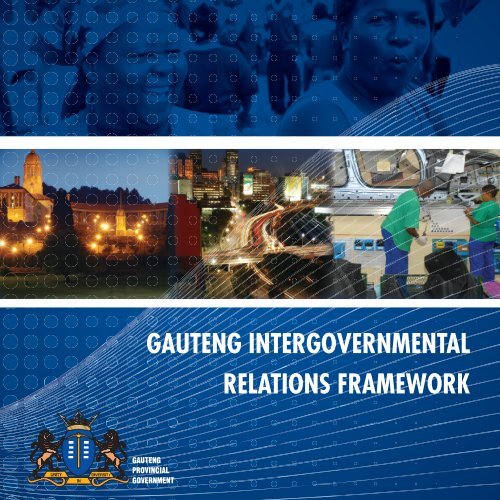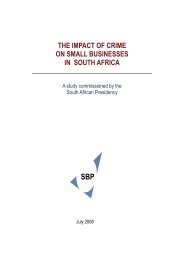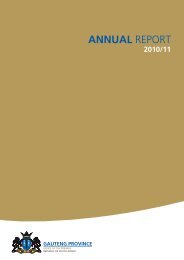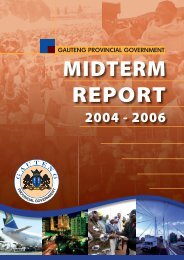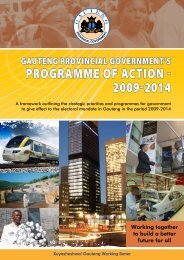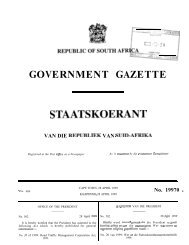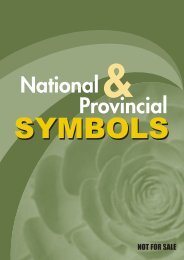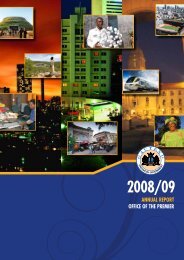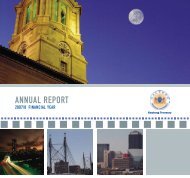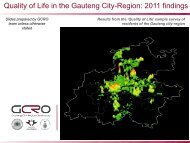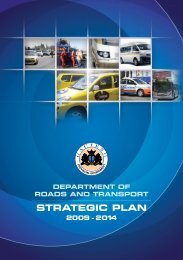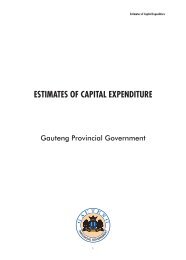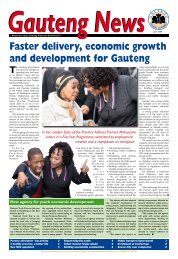IGR report.indd - Gauteng Online
IGR report.indd - Gauteng Online
IGR report.indd - Gauteng Online
You also want an ePaper? Increase the reach of your titles
YUMPU automatically turns print PDFs into web optimized ePapers that Google loves.
gauteng IntergovernMentalrelatIons FraMeworKGAUTENGPROVINCIALGOVERNMENT<strong>Gauteng</strong> IntergovernmentalRelations Framework1
2 <strong>Gauteng</strong> IntergovernmentalRelations Framework
ForewordBy Premier Nomvula MokonyaneAs we enter this new era ofgovernance, a period of renewaland hope and of acceleratedchange and heightened servicedelivery, we shall be guided in allour acts by the mandate givento us by the people…we shalldirect our energies to spendinggovernment time and money onreal delivery issues not intentions.(SOPA, 2009)South Africa can proudly say we scored a distinction for the manner in which wehosted the world’s biggest sporting event, the 2010 FIFA World Cup. We silencedevery critic and registered a resounding success for ourselves and the African continentas a whole. This success is attributed to every man and woman from the village tothe city who contributed in one way or another. This includes those who contributedto the building of the world class roads and stadia infrastructure; those who openedtheir hearts and homes to the visitors from across the globe; the pride with whichwe flew our flag while ensuring that all our guests felt welcome and could see theirnational flags across the province and the unique sound of ‘Vuvuzela’ created aworld cup atmosphere that reached even the most remote corners of our country. It isalso attributed to the role played by the private sector and all spheres of governmentworking together, demonstrating the fact that with sound cooperative governanceand working together, we can do more and even better.We need to sustain and build on this momentum created by the World Cup. The<strong>Gauteng</strong> Intergovernmental Relations Framework comes therefore, at an opportunemoment to create an enabling environment for intergovernmental relations to thrivein the <strong>Gauteng</strong> Province, thereby improving the quality of service delivery.The Executive Council adopted the 2009 ANC Manifesto as a guiding framework, andidentified seven priority areas that would define <strong>Gauteng</strong> Provincial Government’s(GPG) role and participation in this period of renewal, hope and accelerated change.These seven focus areas include: creating decent work and building a growing,inclusive economy; promoting quality education and skills development; providingbetter health care for all; stimulating rural development and food security; intensifyingthe fight against crime and corruption; building cohesive and sustainable communities;and strengthening the developmental state and good governance. These priorityareas find expression in the <strong>Gauteng</strong> 2009-2014 Medium Term Strategic Framework(MTSF) under the theme: Working together to build a better future for all. We neededto develop some mechanisms to ensure the implementation of the MTSF, and thus,the GPG within the spirit of Kuyasheshwa adopted the <strong>Gauteng</strong> Inter-Governmental<strong>Gauteng</strong> IntergovernmentalRelations Framework3
Programme of Action (IG PoA). Considering the developmental agenda in government, national government inparticular, these priority areas were translated into service delivery outcomes.The strengthening and renewal of the activist, developmental state was identified as one of the actions required inorder to implement the MTSF. Key to this action, this administration identified in the IG PoA 2009/10 among otherthings, the development and implementation of the Intergovernmental Relations Framework, structures and systemsneeded as a matter of urgency. This was taken to and discussed in the Extended Executive Council (EXCO) Lekgotlaheld on the 9-11 September 2009. The Office of the Premier was tasked in this Lekgotla to lead <strong>IGR</strong> renewal byensuring cooperative governance based on a shared vision. These decisions were ratified by the meeting of theEXCO held on 23 September 2009. The responsibility for the coordination of provincial intergovernmental relationsin the Office of the Premier was thus elevated from the Deputy Director to a Branch: Intergovernmental Relations andStrategic Partnerships headed by a Deputy Director General.The <strong>Gauteng</strong> Intergovernmental Relations Framework has been approved by both the Executive Council and thePremier’s Coordinating Forum (PCF). It has legislative mandate from the provisions of chapter 3 of the Constitution;and the Intergovernmental Relations Framework Act, 13 of 2005. The <strong>Gauteng</strong> <strong>IGR</strong> Framework is an importantinstrument that will lay a solid foundation for the practice of intergovernmental relations; strengthening and renewalof the activist developmental state and for improved service delivery in the Province. It provides guidelines toactualize the principles of co-operative government and intergovernmental relations as enshrined in Chapter 3 ofthe Constitution. This is with a view to strengthen inter-sphere and inter-municipal relations, and where necessaryto explore interprovincial relations thus affirming that the <strong>Gauteng</strong> Province adheres to the principles of cooperativegovernment.In conclusion, this administration has not only come up with a vision, but has also provided tools for the mission.It is therefore my pleasure to deliver the approved <strong>Gauteng</strong> Intergovernmental Relations Framework and state thatthe establishment of the <strong>IGR</strong> Branch in the Office of the Premier to review intergovernmental relations structures andsystems has been concluded. Kuyasheswa: Getting <strong>Gauteng</strong> Working - let us display the same spirit of cooperativegovernance as displayed before, during and after the FIFA World Cup. Working together as the people of <strong>Gauteng</strong>we can and we will do more to deliver on the mandate given to us by the people._____________________________Nomvula MokonyanePremier<strong>Gauteng</strong> Province4 <strong>Gauteng</strong> IntergovernmentalRelations Framework
oFFICIal sIgn-oFFIt is hereby certified that the <strong>Gauteng</strong> Intergovernmental Relations Framework:• Was approved in the meeting of the Executive Council held on 13/14 July 2010; and• Was approved in the meeting of the Premier’s Coordinating Forum held on 30July 2010We therefore confirm the above; and sign-off this document as an authentic copy of the <strong>Gauteng</strong> IntergovernmentalRelations Framework.Signature:____________________________________Margaret-Ann DiedricksActing Director GeneralSignature:____________________________________Kgaogelo LekgoroMEC: Department of Local Government and HousingSignature: _______________________________Nomvula MokonyanePremier: <strong>Gauteng</strong> Province<strong>Gauteng</strong> IntergovernmentalRelations Framework5
6 <strong>Gauteng</strong> IntergovernmentalRelations Framework
Contents1 Introduction and Context 91.1 The Constitution of the Republic of South Africa, 19961.2 Intergovernmental Relations Framework Act, no 13 of 20051.3 Local Government Turnaround Strategy (LGTAS), 20091.4 Challenges2 Institutional Arrangements 132.1 The Proposed Political Institutional Arrangement2.2 Strategic Agenda Setting and Meetings2.3 Support, Monitoring and Evaluation3 Integrated Development Plan (IDP) asmeans to Cooperative Government 174 GAUTENG <strong>IGR</strong> STRATEGIC FRAMEWORK 205 Conclusion 25<strong>Gauteng</strong> IntergovernmentalRelations Framework7
8 <strong>Gauteng</strong> IntergovernmentalRelations Framework
1 Introduction and ContextThe Intergovernmental Relations as a constitutional, statutory process to facilitate integrated and cooperativegovernance has also been addressed through national, provincial and local policy and strategic planningprocesses. This approach has been informed by the need to ensure cohesive policy planning processes andimplementation with the purpose of achieving service delivery outcomes.Amongst the national strategic initiatives followed are the State of the Nation Address (SONA), the State of theProvince Addresses (SOPA), the national and provincial budget process and tabling and the provincial ExecutiveCouncil Extended Lekgotla. The provincial Executive Council Extended Lekgotla is an initiative by provincial premiersin this case the <strong>Gauteng</strong> Provincial Government Premier to bring together Members of the Executive Council(MECs) and Members of the Municipal Executive Councils (MME’s) and Mayors to discuss a provincial mutual policyprogramme of action and its implementation with the purpose of achieving strategic outcomes. This is an overallexecutive engagement process amongst executive leadership (The Premier and Members of the Executive Council inthe province, Members of the Municipal Executive Councils (MME’s) and Mayors within the spheres of government inthe province.The process is supported by senior government officials including the Provincial Director General, Heads of Departmentsand Municipal Managers. The support process include consolidating departmental and local government strategicplans in line with the approved annual performance plans (APPS) with the purpose of achieving strategic outcomesfor the province.The policy and strategic consideration of consolidating departmental and local government strategic plans issues by thePremier and Members of the Executive Council in the province, Members of the Municipal Executive Councils (MME’s)and Mayors within the spheres of government in the province is then translated into a provincial intergovernmentalrelations programme of action.The <strong>Gauteng</strong> Intergovernmental Relations (<strong>IGR</strong>) Framework therefore facilitates intergovernmental relations andcooperative government within the above broader policy and strategic context and mandate. It also aims to providepragmatic guidelines that will shift co-operative governance from theory to focusing on service delivery and ensuringresponsiveness to citizens’ needs at both macro and micro level. The implementation of the Framework will strengthenrelations between the three spheres of government, link and synergize provincial sector <strong>IGR</strong> Forums, including thePremier’s Coordination Forum, inter-municipal and inter-provincial forums.<strong>Gauteng</strong> IntergovernmentalRelations Framework9
The development of this Framework is based on the premise that unless an integrated and coherent approach toaddress the challenges of governance is undertaken, the spheres of government and departments will continue toplan and implement policies and programmes in isolation of each other. Poor co-operation will lead to inadequate,inefficient or duplicated service delivery.Co-operative governance is a constitutional imperative and the enabling <strong>IGR</strong> Framework Act (2005) provides aframework for the three spheres of government to facilitate <strong>IGR</strong> and also presents mechanisms to settle <strong>IGR</strong> disputes.<strong>IGR</strong> is about improving the delivery of services through effective systems, processes and procedures that ensurecooperation of different role players around policy formulation, planning, monitoring, support and delivery. Thisprovincial <strong>IGR</strong> Framework will guide all spheres of government to act in unison. It will provide a platform for acoherent medium to long term integrated development planning, monitoring and evaluation.Furthermore, co-operative governance is imperative in giving effect to the electoral mandate of the province asencapsulated in the Medium Term strategic Framework (strategic priorities) in order to achieve political outcomesthrough integrated intergovernmental relations programme of action. The provincial strategic priorities are as inTable 1 below:Table 1ManifestoProvincial Priorities1. Creation of decent work and sustainable livelihoods. 1. Creating decent work and building a growing, inclusive economy.2. Education. 2. Promoting quality education and skills development.3. Health. 3. Providing better health care for all.4. Rural development, food security and land reform. 4. stimulating rural development and food security5. The fight against crime and corruption. 5. Intensifying the fight against crime and corruption.6. Building cohesive and sustainable communities.7. Strengthening the developmental state and good governance.There is a range of legislation and policies that inform this Framework. The key legislation and policy directives that underpinthis framework are:1.1 The Constitution of the Republic of South Africa, 1996In Chapter 3 of the Constitution, the basic principles and value of co-operative governance and intergovernmentalrelations are set out. Section 41. (1.)(h.) stipulates that all spheres of government and all organs of state within eachsphere must co-operate with one another in mutual trust and good faith by:• fostering friendly relations;• assisting and supporting one another;• informing one another of, and consulting one another on matters of common interest;• co-ordinating their actions and legislation with one another;10 <strong>Gauteng</strong> IntergovernmentalRelations Framework
• adhering to agreed procedures; and• avoiding legal proceedings against one another.Section 41(2) requires that an Act of Parliament must establish or provide for structures and institutions to promote andfacilitate intergovernmental relations; and provide for appropriate mechanisms and procedures to facilitate the settlement ofintergovernmental disputes.1.2 Intergovernmental Relations Framework Act, no 13 of 2005In response to the constitutional mandate in section 41(2) of the Constitution, the Intergovernmental RelationsFramework Act (Framework Act) was formulated and passed into law in 2005. The provisions set out in the FrameworkAct provided an overall legislative framework applicable to all government entities and provided principles forcooperative governance. The Framework Act aimed to provide for limited legislative intervention to allow for theorganic maturation of intergovernmental relations and allow for it to respond to the dynamic system of government.The Framework Act specifically looks into:••Providing the general principles for <strong>IGR</strong>••Regulation of <strong>IGR</strong> forums••Provision of guidelines to govern internal <strong>IGR</strong> procedures••Providing a framework for the settlement of <strong>IGR</strong> disputes.1.3 Local Government Turnaround Strategy (LGTAS), 2009The Local Government Turnaround Strategy is aimed at counteracting the factors that are undermining our LocalGovernment system. Weak intergovernmental support, oversight, and accountability systems are some of the rootcauses of problems experienced by municipalities. <strong>IGR</strong> is identified as one of the five strategic areas were interventionis critical to restore the confidence of the majority of the people in local government. To turn around local governmentthe following needs to happen:• all three spheres of government will improve Inter-Governmental Relations (<strong>IGR</strong>)in practice• <strong>IGR</strong> structures must be tasked with addressing the factors undermining the Local Government system• There must be a review of all <strong>IGR</strong> structures across government• <strong>IGR</strong> structures must meet regularly and be effective in supporting and monitoring the overall LGTAS including themunicipal turnaround strategies.Therefore, this Framework will be based on the following principles:• Transparency and Democracy: Public participation in government processes• Inclusivity and equality: All spheres of government are equal stakeholders and should participate in thedevelopment of the province’s priorities and developmental agendaTo achieve this vision the following needs to happen:• Community needs should form the basis of Provincial annual plans and Integrated Development Plans<strong>Gauteng</strong> IntergovernmentalRelations Framework11
• <strong>IGR</strong> should facilitate coordination, integration and alignment of planning, budgeting, implementation and<strong>report</strong>ing across the three spheres of government.1.4 ChallengesIt is important to identify and clearly define the challenges that are impediments to the seamless co-ordination ofintergovernmental relations (<strong>IGR</strong>) in the Province in order to develop the appropriate policy interventions to addressthem. Various mediums and forums were engaged to identify these challenges and formulate responses to them.These included, but were not limited to, assessments on the current state of <strong>IGR</strong> in the Province conducted by boththe Office of the Premier and the Department of Local Government and Housing. The <strong>IGR</strong> Conference convenedin November 2009 further provided an opportunity to discuss these challenges and deliberate on the appropriateinterventions needed to address them. The key challenges can be summarized as follows:The <strong>IGR</strong> Framework Act provides the general principles for co-operative governance and the regulation of <strong>IGR</strong> Forumsby giving guidelines to govern internal <strong>IGR</strong> procedures and a framework for the settlement of <strong>IGR</strong> disputes. While theFramework Act provides for the above, it has the following limitations:••Limiting the scope of government to exclude independent institutions and public agencies to form part of the threespheres of government;••Parliament and provincial legislatures have been excluded from the Act. In the case of local government, however,municipal councils, performing both legislative and executive actions, are bound by the Framework Act;••The <strong>IGR</strong> Framework Act is not mandatory and provides no penalties for non-compliance;••The decisions taken in <strong>IGR</strong> Forums are not binding. The <strong>IGR</strong> Forums are there to provide a place for discussionand consultation on areas requiring cooperation between government spheres;••Linkages between Metros are not legislated except where one voluntarily approaches another; and••<strong>IGR</strong> Forums at Sector Department level are not explicitly catered for in the Act.However, the <strong>IGR</strong>F Act allows for flexibility in addressing the Provincial specific challenges of cooperative government. It isan enabling Act that provides space for flexibility and negotiations within certain broad parameters.Another key challenge is the lack of a <strong>Gauteng</strong> Provincial <strong>IGR</strong> Framework that will unpack the current bottlenecks in the <strong>IGR</strong>System of the Province and formulate appropriate interventions. This Framework seeks to address the latter challenge byaligning <strong>IGR</strong> systems to be responsive to the provincial developmental agenda.12 <strong>Gauteng</strong> IntergovernmentalRelations Framework
2 Institutional ArrangementsIntergovernmental Relations in the Province is currently centered on the Extended Executive Council Lekgotla andPremier’s Co-ordination Forum (PCF). These intergovernmental structures were already in existence when Act 13of 2005 took effect and the former meet on quarterly basis while the later meets annually. In terms of the <strong>IGR</strong>Framework Act <strong>IGR</strong>F Act the Premier of <strong>Gauteng</strong> is responsible for <strong>IGR</strong> co-ordination. Functionally, the relationshipbetween the <strong>Gauteng</strong> Provincial Government and national government is mediated through the interactions that thevarious Members of Executive Councils (MECs) and the Premier have with their national counterparts. Historically,these relationships have been conducted through the national intergovernmental forums, called MinMecs as wellas the President’s Coordinating Council and the Forum of South African Directors General (FOSAD). The ExtendedExecutive Council Lekgotla is the vital vehicle that ensures that medium strategic priorities and programmes for theProvince are adopted by the Provincial EXCO and Municipalities. The Lekgotla is the forum where the two spheres ofgovernment agrees and adopts the priorities and programmes for the whole of government.Within the context of the electoral policy mandate and strategic priorities of the Province and by building on the existingfoundations, to realize vision 2055, the GPG has established the <strong>Gauteng</strong> Planning Commission. The purpose ofestablishing the Commission is to facilitate short, medium and long term planning and embark upon a process todevelop a shared vision with the people of <strong>Gauteng</strong>. The work of the Commission in the context of the ExtendedExecutive Council Lekgotla process and the development of the provincial Intergovernmental Programme of Actionand strategic outcomes assists and complement the province in building a developmental state which has the capacityto effect socio-economic transformation through clear and strategic integrated programmes and plans.The Provincial Planning Cycle begins in September of each year with Departments reviewing their annual performanceplans and planning for the following year and the medium term. Each department will produce short, medium andlong - term priorities as well as mid- term <strong>report</strong>s and a mid-term review. The draft annual performance plans andthe budget statements for the forthcoming financial year are finalized by November/December. At municipal level theplanning process begins in August with the IDPs reviewed after the adoption of IDP process plans. Between Septemberand November the priority setting and consultations phase kicks in. The IDPs and budget are adopted by council inJune. The different budget and planning cycles of the three spheres present a challenge which can be addressed bystreamlining the provincial <strong>IGR</strong> processes and thus ensuring government works in an integrated fashion.A number of provincial Departments have made significant progress in initiating different forms of intergovernmentalengagements with municipalities. This progress includes the establishment of a number of <strong>IGR</strong> Forums between theMECs and Portfolio Councilors (MMCs), which are central and important to integrated planning and service delivery.<strong>Gauteng</strong> IntergovernmentalRelations Framework13
However, almost all intergovernmental forums established in the sector departments are non-statutory or have nolegal standing because they fall outside the scope of the <strong>IGR</strong>F Act. This provides an opportunity to strengthen andestablish linkages between them and statutory structures as provided by the Act. The <strong>IGR</strong>F Act is a framework that isnot static and allows for flexibility in application. Sector Departments are catered for by the Act in relation to section21(1)(a), which stipulates “that the Premier may establish <strong>IGR</strong> Forums for any functional area to promote and facilitateeffective and efficient intergovernmental relations between local government and the province with respect to thatfunctional area.”There are also inconsistencies in the manner in which <strong>IGR</strong> is managed at local level. Some municipalities, especiallyDistrict and Local municipalities do not have enough human and fiscal resources to institutionalize <strong>IGR</strong>. This has abearing on the role and positioning of <strong>IGR</strong> unit and the organizational ability to practice authority over the samefunctional areas (schedule 4b matters). In some municipalities <strong>IGR</strong> Forums were established as ‘innovative structures’to facilitate <strong>IGR</strong> and they take different forms. Furthermore there is no uniformity in relation to the location of these<strong>IGR</strong> units in municipalities. In some municipalities <strong>IGR</strong> units are located within the Mayor’s Office or Office of theSpeaker whilst others are accountable to the Municipal Managers. At District level, information on <strong>IGR</strong> mattersoften does not trickle down to local municipalities. Regrettably, there are municipalities without a dedicated <strong>IGR</strong>unit with staff and resources. The non-existence of <strong>IGR</strong> units has not prevented the development of <strong>IGR</strong> initiatives inmunicipalities. However, dedicated <strong>IGR</strong> capacity contributes to the strengthening of <strong>IGR</strong>.The Constitution recognizes traditional institutions and leadership and there are machineries through which the tworecognized Traditional Authorities in the Province can participate in the <strong>IGR</strong> system.Lastly, there is little or no relationship between <strong>IGR</strong> practitioners (officials) in the province, which makes it impossibleto share lessons and experiences and challenges. This leads to officials in both Departments and Municipalitiespulling in different directions. These institutional arrangement challenges impede on the achievement of greateralignment and integration of intergovernmental planning, and the effective participation of sector departments inlegislated <strong>IGR</strong> structures.2.1 The Proposed Political Institutional ArrangementThe proliferation of <strong>IGR</strong> Structures and forums beyond those required by the <strong>IGR</strong>F Act is challenge that this proposedstructure aims to address. The arrangement does not seek to invent new structures but find linkages between theexisting statutory and non-statutory structures for purposes of integrated planning, <strong>report</strong>ing and monitoring ofgovernment programmes. The hierarchy of planning and <strong>report</strong>ing of the provincial government remains intact butthe proposed structure (Annexure A) allows for greater intergovernmental consultation and joint planning betweenthe Province and municipalities. Programmes and plans developed at the Extended Exco. Lekgotla are adopted andtranslated into APPs of Departments and IDPs of municipalities. The integration of plans will take place between theMECs and Portfolio Councilors before submissions to Cabinet and Mayoral committees respectively. The integrationof plans and monitoring of implementation of those plans will be the main agenda items quarterly meetings of MECand MMCs.14 <strong>Gauteng</strong> IntergovernmentalRelations Framework
The structure is also important for purposes of <strong>report</strong>ing and monitoring of progress and the monitoring and evaluationframework will provide an early warning signal to service delivery blockages. A two way <strong>report</strong>ing channel is providedby the structure for the provincial government to monitor and support municipalities. The Provincial Executive Councilwill receive feed back through cabinet processes and the PCF.The only <strong>IGR</strong> Forum that is created by the proposed structure is the Metro <strong>IGR</strong> Forum between the three MetropolitanMunicipalities in the Province. The terms of reference will guide the role and functions of this Forum but its existenceis important to advance the objectives of the <strong>Gauteng</strong> City region (GCR).The Technical support structure will be aligned to the political structure at both municipal and provincial levels.Technical support is required to effectively institutionalize <strong>IGR</strong> in both municipalities and sector departments. Dedicatedstaff and resources need to be availed to built capacity in the management and practice of <strong>IGR</strong>.2.2 Strategic Agenda Setting and MeetingsDue to lack of provincial <strong>IGR</strong> guidelines and central co-ordination point there is growing duplication of services and thispresents a challenge to provincial integrated planning and implementation of programmes including the provincialintergovernmental relations programme of action agreed through the provincial Executive Council Extended Lekgotlaprocess as a mutual programme to achieve policy and strategic outcomes. Different financial years for the local andprovincial governments also compound this challenge. There is a growing need to synergize budgeting and planningcycles of all spheres to promote common developmental agenda and realization of medium term goals. The focuson <strong>IGR</strong> engagements should be both on strategic and mandatory budgeting and planning matters and issues ofprovincial mutual strategic interest to achieve provincial strategic outcomes. This Framework will guide all spheres ofgovernment to reprioritize and align their plans with those of the province.There is a need to address the challenges of engagements between sector departments and municipalities inorder facilitate effective coordination for improved service delivery. The development of an annual schedule of <strong>IGR</strong>engagements that is informed by the planning and budgeting cycles of both spheres for more effective managementof the relationships between the spheres is critical to this process. The <strong>IGR</strong> Framework should streamline thesemeetings and ensure that <strong>IGR</strong> meetings are convened at strategic interval in the planning and budgeting cycles of allspheres. The following table (Table 2) will address this challenge by streamlining the <strong>IGR</strong> processes and the planningcycles of the three spheres to ensure integration of priorities and programmes.<strong>Gauteng</strong> IntergovernmentalRelations Framework15
Table 2<strong>IGR</strong> PROCESS DATE AGENDAEXTENDED CABINET LEKGOTLA JANUARY Formulate and adopt strategic priorities and programmes for thegovernmentPREMIER’S CO-ORDINATING FORUM (PCF) MAY Final provincial IDPs’ input before adoption by councils.SEPTEMBERIDPs’ Community & Stakeholders consultation Plans and sectordepartment plansNOVEMBERAPPs and Budget StatementMARCHDraft IDPs and Budget and final APPsMEC/MMCs Quarterly Formulate Sector Plans and implementation Plans.Report on implementation of sector plansPrepare <strong>report</strong>s for PCF and EXCO2.3 Support, Monitoring and EvaluationThe decisions of <strong>IGR</strong> structures are not binding and there are no mechanisms to track the implementation thereof.This is mainly due to the fact that priorities and plans of spheres of government are not synergized and as such thereare different key performance areas and indicators. There are no penalties for non-performance on decisions takenby these structures because they were not part of the plan. The <strong>IGR</strong> Framework seeks to address this shortcoming.16 <strong>Gauteng</strong> IntergovernmentalRelations Framework
3 Integrated Development Plan (IDP) asmeans to Cooperative GovernmentAn IDP is a plan that gives an overall framework for development of an area. It aims to coordinate the work ofall spheres of government in a coherent manner to improve the quality of life for all the people living in anarea. According to the Municipal Systems Act, no. 32 of 2000, all municipalities have to produce and adoptan IDP. The municipality is responsible for the coordination of the IDP and must draw in other stakeholders who canimpact on and/or benefit from development in a specific area (see Figure 1 below). Once the IDP is drawn up allmunicipal planning and projects should happen in terms of the IDP.Figure 1National Provincial MunicipalArea of ImpactSource: Towards Integrated Development Planning in <strong>Gauteng</strong>: The Origins and Transformation of IDPTSC; DLG - 2008Furthermore the Department of Cooperative Governance and Traditional Affairs (CoGTA) developed a LocalGovernment Turnaround Strategy (LGTAS) which places emphasis on the essence of an IDP as an expression of allof government’s work within a municipal space. Thus there is a need to improve systems and processes to create anenabling environment for the IDP to play the coordination role. Given the cooperative nature of <strong>IGR</strong>, hierarchicalpractices of the different spheres of government have hitherto borne little result. What is required is a system of<strong>Gauteng</strong> IntergovernmentalRelations Framework17
engagement and collaboration that will ensure the protection of the integrity of all the spheres of government in thedelivery of services in pursuit of the constitutional principles of cooperative governance, which the <strong>IGR</strong> Frameworkseeks to achieve.One of the greatest lessons emerging from the past 15 years of democracy is the fact that intergovernmental planning,because of its multi-stakeholder implications, must be coordinated by a body with no sectoral interests. The <strong>Gauteng</strong>Planning Commission (GPC) will therefore be vital in pulling together all spheres of government’s mutually agreedprogrammes and strengthen <strong>IGR</strong>. The formation of both national and provincial Planning Commissions offers anopportunity for strengthening vertical and horizontal alignment. The commissions will ensure horizontal alignmentat national and provincial spheres, which has thus far been very limited. In turn this will provide a much needed‘provincial and national’ perspectives of development within the various municipal spaces which will further aidcoordination with local government. Furthermore, the Planning Commissions will be crucial in the implementation ofthe <strong>Gauteng</strong> Spatial Development Perspective 1 (GSDP).The <strong>Gauteng</strong> Medium Term Strategic Framework (MTSF) on the other hand sets out seven priorities 2 that wouldguide the province’s development within the next five years (2009-2014). These priorities for development shouldfind expression in the IDPs in the form of programmes and projects. However for these priorities to be effectiveand implementable with clear performance measures, strengthening of partnerships for development and goodgovernance are vital. This is the area where the role of the <strong>Gauteng</strong> Planning Commission (GPC) should bestrengthened in ensuring a smooth transition from priority setting to outcomes based approach, which is all aboutmeasurable performance and delivery.The paradigm shift from priority setting to Outcomes Approach is premised on the review of government performanceof the past fifteen years (Towards a Fifteen Year Review Report, 2008). The <strong>report</strong> asserts that while government hadachieved a great deal in terms of service delivery, it did not get the desired outcomes as prescribed in the manifestoof the governing party. Furthermore there is a realization that a route to achieving those outcomes (twelve outcomeswere identified and are as a result of the priorities as set out in the MTSF) is the improvement of technical capacityof the state to monitor and evaluate programmes of government. Moreover, The GPC’s role is that of ensuring thatall spheres of government depart from a common ground in achieving provincially intergrated development andstrategic outcomes.Premised on the <strong>Gauteng</strong> Medium Term Strategic Framework is the <strong>Gauteng</strong> Intergovernmental Programme of Action2009/10, which dictates that all spheres of government work together in implementing the priorities of the provinceand achieving outcomes for 2014. Nonetheless effective integration, coordination and alignment of the actions ofgovernment’s three constitutive spheres remain a major challenge in the quest to improve the quality of life. This1 The Spatial Development Perspective aims to ensure better urban and land use planning. It takes into account and aims to provide a framework for the spatial development plans. It also serves as a platform to guideand align infrastructure investment and development spending across <strong>Gauteng</strong> and by various spheres of government and the private sector.2 Creation of decent work and building a growing, inclusive economy; promotion of quality education and skills development; better health care for all; stimulation of rural development and foodsecurity; intensification of the fight against crime and corruption; building cohesive and sustainable communities and strengthening the developmental state and good governance.18 <strong>Gauteng</strong> IntergovernmentalRelations Framework
observation is also documented in the National Fifteen-Year Review Report where the lack of intergovernmentalintegration and minimal cooperation is highlighted as a challenge that remains despite the plethora of IntergovernmentalStructures that have emerged to promote integration and cooperation. The Review argues that challenges have been“particularly acute where national and provincial government spheres hold concurrent authority, or where a functionis allocated to all spheres or both tiers (sic) of local government” (Towards a Fifteen Year Review, 2008).Therefore it is within this context that the centrality of IDP processes in realizing integration and cooperation acrossthe three spheres of government was emphasized in the state of the Nation Address on the 3rd February 2006. Theemphasis was on integration of planning and implementation across the government spheres, which remained oneof the prime areas of focus for government. This was subsequently elevated in the State of the Province Address ofFebruary 2007, where there was a pledge to ensure alignment of provincial plans to local economic developmentplans. The alignment and integration of plans is one of the fundamental principles of the Global City Regionperspective (GCR).The GCR perspective or model advocates a new way of thinking about development agenda in the province. Theconcept was launched in 2007 as a plan for the three spheres of government to build <strong>Gauteng</strong> as a GloballyCompetitive City Region. This notion was conceived due to a realization that <strong>Gauteng</strong> was characterized by inequalityand uneven economic and spatial development 3 . Central to the success of <strong>Gauteng</strong>’s global competitiveness is theinstitutional framework to govern the city region, solid intergovernmental relations and strategic partnerships withvarious institutions (Research and Academic Institutions) and other stakeholders.The notion of GCR is further supported by the National Spatial Development Perspective (NSDP) which was approvedby Cabinet in January 2003 and it provides a common framework to guide development planning at all levels andsets out a methodology that all spheres of government should follow in conducting their planning processes. Thismethodology promotes the development of a coherent understanding of spatial realities, recognizing that patternsof economic development, social exclusion and resource use are of paramount importance in developing spatialplans. Therefore the success of the GCR lies in government’s ability to integrate plans and maximize the impact ofdevelopment and credible IDPs can be a genuine aid to intergovernmental planning and implementation. As such,they should remain an expression of development programmes of all three spheres of government in a shared areaof impact (as illustrated by Figure 1 above).3 The GSDP is a response to this challenge. It maps out current and future development patterns for the province, including social, economic, infrastructure, human settlement, environmental, transport and othercharacteristics.<strong>Gauteng</strong> IntergovernmentalRelations Framework19
4 GAUTENG <strong>IGR</strong> STRATEGIC FRAMEWORKThis chapter or section provides a framework that seeks to serve as a guide to the conduct of intergovernmentalrelations in the <strong>Gauteng</strong> Province. It takes into account the challenges raised in the foregoing chapters and seekto provide responses cum proposals fitting to realize the aspirations of the ‘era of renewal’ as adopted by thecurrent government and to render intergovernmental relations effective in the <strong>Gauteng</strong> Province. It is also cognizantof the dynamic and evolutionary nature of intergovernmental relations, consequently it remains more of a strategic‘framework’ than a policy and therefore open to future reviews as circumstances may dictate. It is crafted in fullrecognition that the overall coordination of intergovernmental relations in the Province is the Premier’s domain toprovide political leadership so as to give effect to political priorities. The political leadership in the intergovernmentalrelations is pivotal in the aligning and directing spheres of government towards the same goal; and thus ensuringthat political priorities across the Republic are harmonized to flow in the same developmental direction. The followingparagraphs provide a way forward to the approach on intergovernmental relations:••Intergovernmental structures in the provincial government: As it is indicated that there is a plethora ofintergovernmental relations’ structures and forums and the existence of some of them is hardly known, becausemost of these structures were created as innovative mechanisms to facilitate intergovernmental relations beforethe Intergovernmental Relations Framework Act took effect. This has caused coordination and monitoring oftheir operations almost impossible and intergovernmental relations weak in the Province. In order to remedy thissituation, all existing other provincial intergovernmental structures and forums shall be required to submit theirterms of reference to the Premier upon the approval and adoption of the <strong>Gauteng</strong> Intergovernmental RelationsFramework.••Establishment of other provincial intergovernmental structures and forums: The MEC/MMCs’ Forumsshall be deemed to have been established by the Premier in every sector department upon the adoption of thisFramework. The Premier may establish other provincial intergovernmental forums in sector departments based onoutcomes and priority areas upon written requests over and above the MEC/MMC Forums. A sector departmentdesiring to have an additional forum or forums shall submit a written request stating the need of the soughtintergovernmental structure or forum and attach its terms of reference to the Premier to establish the desiredforum in terms of section 21 of the Intergovernmental Relations Framework Act 13 of 2005. Some of theseforums shall include service delivery forums linked to service delivery agreements and shall cease to exist uponattainment of the outcomes.••Operational guides for other provincial forums: Similar to other provincial intergovernmental forums thatare established by the Premier upon written requests; the MEC/MMC Forums shall provide the Premier with theirterms of reference at least two months after the adoption of the Framework. These terms of reference shall beapproved by the PCF and serve as the operational guides for the forums and can only be amended on consensus20 <strong>Gauteng</strong> IntergovernmentalRelations Framework
y members constituting such a forum. All the provincial intergovernmental forums shall, for planning purposes(so that an intergovernmental relations calendar could be developed and be ready by the beginning of the year),provide the Premier with the schedule of planned meetings for the ensuing financial year at the end of every thirdquarter of a current financial year.••Technical support for the forums: A provincial intergovernmental relations established by the Premier mayupon need and when necessary establish a technical support structure. The overall role of the technical supportstructures is to provide technical support to intergovernmental forums. Such a technical support structure shalldevelop its terms of reference and shall be accountable to that particular provincial intergovernmental forum. Itis therefore not necessary that the existence of such structures may have to be known by the Premier.••Conduct of provincial intergovernmental forums: Provincial intergovernmental forums shall conduct theiractivities to advance the Province’s strategic priorities and to heighten quality of service delivery in the <strong>Gauteng</strong>Province. Intergovernmental forums having engagements with national departments on programmes or mattersof strategic importance to the <strong>Gauteng</strong> province shall inform the Office of the Premier or direct such departmentsto inform the Office of the Premier of those particular engagements. They shall submit <strong>report</strong>s on outcomes fornoting or memoranda seeking approval to the Premier through the Premier’s Coordinating Forum from anyimportant engagements with the other spheres of government.••Agenda setting: The agenda setting of other provincial intergovernmental forums shall be in accordance withtheir agreed upon terms of reference. The Premier shall determine the agenda of the Premier’s CoordinatingForum taking into account planning and budgeting cycles; provincial Intergovernmental Programme of Action;provincial priorities and any other matters for inclusion in the agenda from other provincial intergovernmentalforums shall be submitted in accordance with determined provincial procedures.••Reports and referrals to the President’s Coordinating Council (PCC): The PCF must <strong>report</strong> at leastannually to the PCC on progress with the implementation of a national policy or legislation or on matters ofnational interest that have a risen in the forum.••Interprovincial forums: In the spirit of co-operative government and intergovernmental relations as espousedin the chapter 3 of the Constitution; the Premier may, in terms of the Intergovernmental Relations FrameworkAct, and perhaps ‘should’ enter into interprovincial forums with other provinces in promoting common priorities,share experiences and best practice.••Intergovernmental relations at local government in the Province: Local government in the <strong>Gauteng</strong>Province has complied with the provisions of the Intergovernmental Relations Framework Act by establishingintergovernmental forums. It is however, experiencing challenges ranging from ineffective and inefficientintergovernmental structures; lack or insufficient interdepartmental, intermunicipal and ad hoc intersphereconsultations, inconsistent attendance of <strong>IGR</strong> meetings and limited capacity in other municipalities; to challengesof coordination of those <strong>IGR</strong> structures in other municipalities. There is also no clarity as to who is responsiblefor intergovernmental relations at local government. There are <strong>report</strong>s that in other municipalities it is eitherthe Executive Mayor or the Speaker taking charge of intergovernmental relations matters. The following tries toremedy the situation:––Coordination of intergovernmental relations at local government: The overall responsibility for coordinationof intergovernmental relations at local government shall be the executive mayor of a district municipality or<strong>Gauteng</strong> IntergovernmentalRelations Framework21
an administrator if that municipality is subject to an intervention. The executive mayors of the category A andB municipalities are responsible for coordination of intergovernmental relations within their jurisdiction.––Ineffective and inefficient intergovernmental structures: In situations where there are a lot of <strong>IGR</strong> structures, itnormally ends up in duplications, lack of accountability and thus structures becoming redundant. The districtswith the cooperation of local municipalities should upon adoption of the Framework conduct an ‘audit’of <strong>IGR</strong> structures for the purposes of accountability, monitoring and evaluation. This should also ease thechallenge of coordination of structures.––Intergovernmental structures and support at local government: The district intergovernmental forums shallbe the main <strong>IGR</strong> forum in category B municipalities. Different <strong>IGR</strong> forums may be established for particularfunctions and all structures recognized by the executive mayors can establish technical support structures.The recognized <strong>IGR</strong> structures in the district shall forward their terms of reference to the executive mayor whowould then forward it to the MEC for Local Government and Housing and copy them to the Premier.––Ad hoc inter-sphere engagements: There is a problem that officials in departments within a municipality,or local municipalities within a district have engagements with either a provincial or a national departmentwithout the knowledge of the council as a whole. The district forums should sanction the development ofa municipal <strong>IGR</strong> policy or a framework in line with provincial framework to guide conduct of officials withregard to interaction with other spheres of government or other municipalities. The Department of Localgovernment and Housing shall provide capacity support in the development of such frameworks.––Intermunicipality forums: The need to improve alignment in plans of government in <strong>Gauteng</strong> Province is notonly necessary between the provincial government and local government; but it is also a challenge betweenand among local government itself. Municipalities are urged to enter into intermunicipality forums wherealignment of plans, particularly spatial development frameworks (SDFs) and land use management systems(LUMS) along the borders could be aligned. The Department of Local Government and Housing and the<strong>Gauteng</strong> Planning Commission to provide support to municipalities.––Referrals to the Premier’s Coordinating Forum: Reports and referrals to the PCF or any other provincialintergovernmental Forum established in terms of section 21 of the Act shall be made through the districtintergovernmental forum (not unless stated otherwise) or the executive mayor in the case of category Amunicipalities.••Cooperation between the Metropolitan Municipalities: The <strong>Gauteng</strong> Province has three metropolitanmunicipalities (City of Tshwane, City of Jo’burg and Ekurhuleni Metropolitan Municipalities) with differentcomparative and competitive advantages. The challenge is a perceived lack of communication and engagementon areas mutual strategic interests with regard to these different municipalities’ planning and execution of plans.These metropolitan municipalities should consider establishing a Metro’s Intergovernmental Forum (MIGF) seeingthat the Province is already pursuing a metropolitan form of governance.••Challenges on traditional leadership: The institution of traditional leadership is a new development inthe <strong>Gauteng</strong> Province and the City of Tshwane and Metsweding District Municipalities are the only affectedmunicipalities. There are working relationships between these institutions of governance which is also characterizedby different viewpoints on how other matters should be approached. These relations shall be enhanced with22 <strong>Gauteng</strong> IntergovernmentalRelations Framework
the implementation of the <strong>Gauteng</strong> Policy Framework on Traditional Leadership and Governance 4 . The PolicyFramework highlights among other things, roles, functions and powers of traditional structures in relation tolocal development and service delivery. It further highlights areas of shared responsibility with local government.The partnership between the municipalities and the traditional leadership shall be promoted by the provincialgovernment through legislative and other measures. The <strong>Gauteng</strong> Traditional Leadership and Governance Bill to this effect is currently being developed. The Bill establishes traditional councils which shall facilitate the workingrelations between the municipalities and traditional communities. The affected municipalities shall work with theinstitution of traditional leadership within and through the <strong>Gauteng</strong> Policy Framework on Traditional Leadershipand Governance, the Traditional Leadership and Governance Framework Act, (Act 41 of 2003) and otherapplicable national legislations like the Municipal Systems Acts, until the <strong>Gauteng</strong> Traditional Leadership andGovernance Bill is finalized.••Integrated development planning: Integrated development plans (IDPs) desired to be a PLAN FOR ALLGOVERNMENT at a local level remains a strategic tool for intergovernmental relations. It is capable of bringingtogether all the three spheres of government, properly coordinated has a potential to effectively allow foralignment of plans for the three spheres of government in a municipal space to take place. There is however,still a challenge of poor inter-municipal planning in the Province. The districts should, with a support of theDepartment of Local Government and Housing, establish as one of the forums an IDP Forum to ensure thatintegrated development planning takes place within co-operative government in line with the requirements ofthe Municipal Systems Act 32 of 2000. There is also a challenge that municipalities do not get information ontime from national and provincial departments to allow them to plan properly. An intergovernmental forumresponsible for the coordination of the IDPs led by the <strong>Gauteng</strong> Planning Commission (GPC) with the support ofthe Department of Local Government and Housing should be established to ensure that national and provincialdepartments timely provide information and assistance to local government as per requirements of section 35 ofthe Municipal Finance Management Act.••Joint programmes and implementation protocols: The other prominent intergovernmental challenge inthe Province pertains to departments working in silos. This affects the whole provincial as well as municipalintegrated development planning and compromise quality of service delivery. In order to heighten service delivery,the Office of the Premier should facilitate workshops on joint programmes and implementation protocols andon the outcomes based approach. The outcomes based approach emphasis is on measurable performance,accountable delivery and clear set of outcomes and how best to achieve them.••Embedding intergovernmental relations approach to officials at all levels: It is a challenge thatintergovernmental relations is still taken as an ‘add-on’ by most departments in implementation of theirprogrammes. This is mainly attributed to the fact that intergovernmental relations is still less understood andnarrowly interpreted. It is recommended that the Framework makes provisions for the creation of <strong>IGR</strong> Unitsor individuals dedicated to intergovernmental relations in sector departments and in municipalities. This shallnecessitate the establishment of an <strong>IGR</strong> Practitioners’ Forum which shall be instrumental in considering waysand workshops to expand intergovernmental relations knowledge and to embed intergovernmental relations’approach to officials at all levels. An Extended Executive Council Lekgotla at the end or beginning of a financial is4 Recently adopted by the Executive Council in … 2009<strong>Gauteng</strong> IntergovernmentalRelations Framework23
crucial to consider <strong>report</strong>s, assess intergovernmental relations’ performance and make pronouncement on majorintergovernmental relations programmes for a following new financial year or current year depending on the timethe conference is held. This Lekgotla should be followed by a strategic workshop of the senior officials in a spaceof a month to come up with strategic plans for implementation of the programmes.••Monitoring and evaluation: The overall oversight of intergovernmental relations lies with the Premier’sCoordination Forum chaired by the Premier. Other provincial intergovernmental forums shall be held accountableon the basis of the <strong>IGR</strong> calendar of events submitted by forums at the end of every third quarter of a currentfinancial year. In order to allow for pre-implementation evaluation, intergovernmental forums shall forwardproposals or memoranda to the PCF for evaluation before they may commence with implementation. In orderto monitor any undertaken activity during the implementation process the Office of the Premier on behalf ofthe Premier may from time to time request progress <strong>report</strong>s on each phase of implementation. Important to themonitoring and evaluation is the dissemination of correct information timeously. The Office of the Premier shouldupon approval of the Framework develop a system to track the intergovernmental decisions, disseminate themto appropriate implementing departments and forums and monitor implementation. This shall require beyondscope of the Intergovernmental Relations Framework Act, an additional capacity in the Office of the Premierand can be facilitated by established and effective intergovernmental directorates in the sector departmentsand municipalities and an effective provincial <strong>IGR</strong> Practitioners’ Forum. The quarterly <strong>report</strong>s submitted by theforums shall be analysed and used to evaluate performance of the forums. The consolidated <strong>report</strong>s will bepresented in the Extended Executive Lekgotla where major intergovernmental programmes shall be pronouncedby the political principals for implementation. Similar to local governments, as indicated that they, dependingon the matter, they will <strong>report</strong> and make referrals to the PCF or to a specific other provincial forum. They willfurther monitor and assess performance at districts level with the support of SALGA and the Department of LocalGovernment and Housing. Other <strong>report</strong>s and referrals to the PCF shall be received on quarterly basis throughthe MEC/MMCs <strong>report</strong>s.••Settlement of intergovernmental disputes: Conflict is inherent in intergovernmental relations and the Actobliges all organs of state to make every reasonable effort to avoid intergovernmental disputes when exercisingtheir statutory powers or performing their statutory functions; and to settle intergovernmental disputes withoutresorting to judicial proceedings. The Framework submits that any aggrieved organ of state within the <strong>Gauteng</strong>Province shall exhaust all intergovernmental arrangements before declaring a formal intergovernmental disputesagainst another organ of state.24 <strong>Gauteng</strong> IntergovernmentalRelations Framework
5 ConclusionThe Framework is informed by the need for both pragmatic and programmatic principles of Intergovernmental Relationsand Cooperative Governance in the <strong>Gauteng</strong> Province. It is pragmatic in a sense that it is less than a policy but aFramework that simply seeks to provide guidelines to put principles of co-operative governance and intergovernmentalrelations in practice with a view to strengthen inter-sphere and intermunicipal relations in the Province, and interprovincialrelations. The inter-sphere and inter-municipal relations has a potential through the provincial Executive Council ExtendedLekgotla process, the IDP’s process and the GPC role with a strong and proper coordinated intergovernmental relationsto enhance alignment and coherent integrated development planning. The interprovincial forums seek to reaffirm that the<strong>Gauteng</strong> Province espouses the principles of co-operative government in the Constitution and to show that the Republic ofSouth Africa is not a competitive federal system but a cooperative government working for the good of the Republic. It isprogrammatic in that the Framework in its approach suggests that certain instrumental measures and commitment throughleadership have to be in place, for example, get institutions right, forums with clear programmes, and every role-playerstaking correct positions to oil the government machinery in order to heighten service delivery. It takes into account theoutcomes based approach and realizes that implementation of joint programmes will need to be implemented by differentstakeholders using implementation protocols. In line with this, the Framework realizes that a need shall arise to establishservice delivery forums to fast-track implementation of the service delivery agreements in order to attain an envisionedoutcome that may be based on a programme. The Framework is premised on the assumption that IntergovernmentalRelations and Cooperative Governance are constitutional imperatives and operate in terms of Intergovernmental RelationsFramework Act, 13 of 2005. The Framework acknowledges that intergovernmental relations is dynamic and evolutionaryin its nature and therefore opens itself to future reviews should circumstances dictate otherwise.<strong>Gauteng</strong> IntergovernmentalRelations Framework25
annexure aAnnexure A: depicts a graphic presentation of the proposed political institutional arrangements26 <strong>Gauteng</strong> IntergovernmentalRelations Framework
<strong>Gauteng</strong> IntergovernmentalRelations Framework27
28 <strong>Gauteng</strong> IntergovernmentalRelations FrameworkKUYASHESHWA: <strong>Gauteng</strong> Working Betterwww.gautengonline.gov.za • Call centre: 0860 42 88 364


